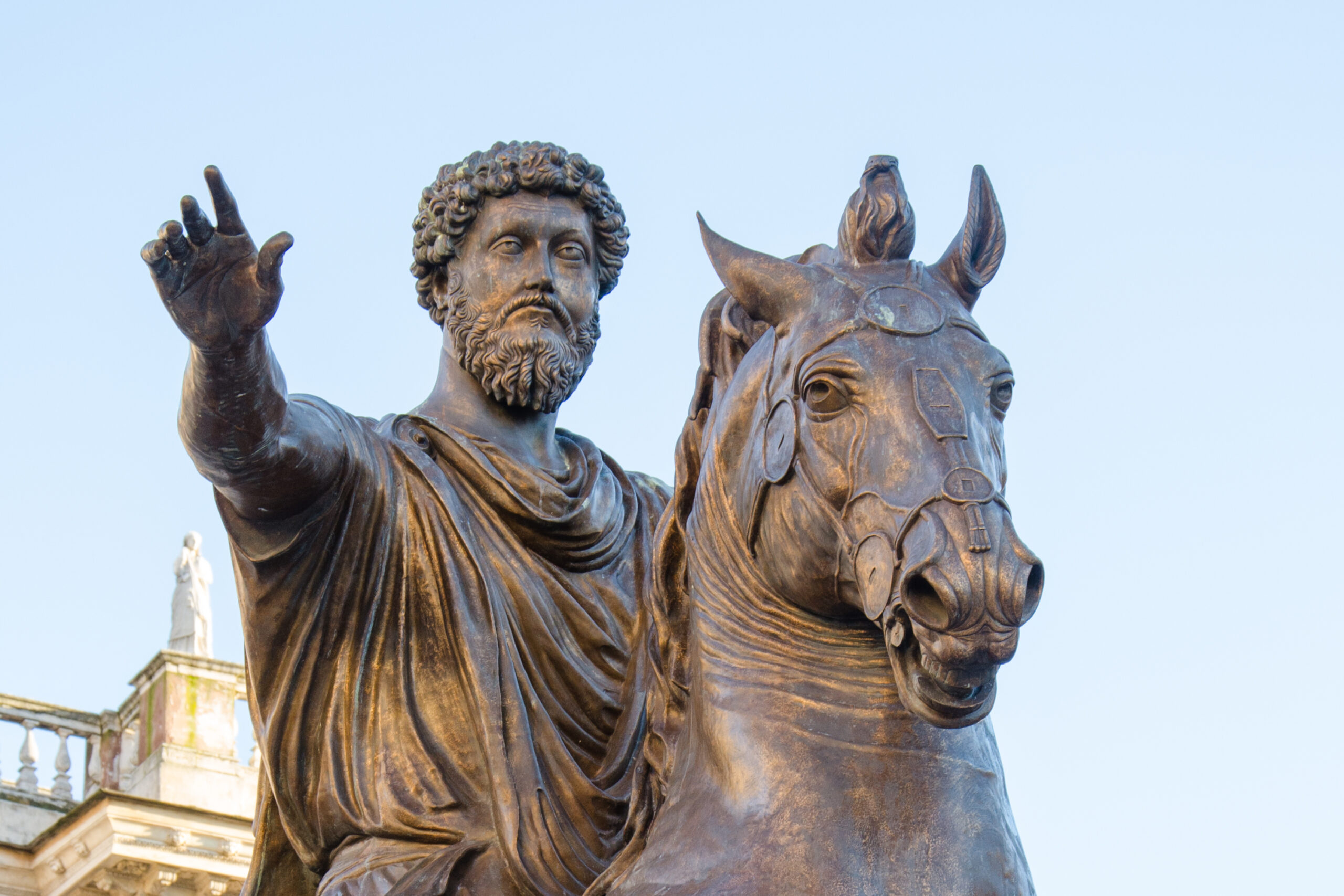Applying Lessons from Marcus Aurelius to Business Strategy: Stoic Wisdom for Effective Leadership
- Posted in Strategy
- 7 mins read

Marcus Aurelius, the Roman Emperor and Stoic philosopher, exemplified wisdom, resilience, and effective leadership during his reign. His philosophical reflections, recorded in his famous work “Meditations,” offer valuable lessons that transcend time and can be applied to modern business strategy. His timeless insights, rooted in Stoicism, offer profound guidance for today’s business challenges. Marcus Aurelius, known for his reflective and pragmatic approach to leadership and life, penned thoughts that have endured for centuries, encapsulating the essence of Stoic philosophy. This philosophy emphasizes resilience, ethical decision-making, and the importance of rational thought – all crucial elements in the small business landscape.
This article will explore critical lessons from Marcus Aurelius’s life and teachings and how they can guide entrepreneurs and leaders in today’s competitive business world, fostering effective leadership and success. From facing adversity with fortitude to making ethical decisions, Aurelius’ principles are surprisingly relevant to the modern entrepreneur. We will uncover how his emphasis on resilience, leadership, relationships, and change management can guide small business owners in creating sustainable, thriving enterprises. By integrating these ancient lessons into contemporary business practices, small business owners can find a unique edge, enabling them to navigate the complexities of their ventures with a clearer, more grounded perspective.
Understanding Marcus Aurelius and Stoicism
Before we can apply the wisdom of Marcus Aurelius to small business strategy, it’s essential to understand the man and the philosophy he espoused. Marcus Aurelius, Roman Emperor from 161 to 180 AD, is often remembered not just as a ruler, but as a philosopher-king. His most famous work, “Meditations,” offers a unique glimpse into his thoughts and guiding principles, many of which are rooted in Stoicism, an ancient philosophy that emphasizes discipline, resilience, and the virtue of wisdom.
The Essence of Stoicism
Stoicism, founded in Athens in the early 3rd century BC, teaches the development of self-control and fortitude as a means of overcoming destructive emotions. The philosophy asserts that virtue (such as wisdom) is happiness, and it is our perceptions of things that cause the majority of our troubles. Stoics strive for inner peace by practicing control over their reactions to life’s challenges.
Key Principles of Stoicism Relevant to Business:
- Control and Acceptance: Understanding what is within our control and what is not. In business, this translates to focusing energy on actionable areas and accepting market realities.
- Rationality Over Emotion: Emphasizing logical over emotional responses to situations. For a business owner, this means making decisions based on data and analysis rather than impulses or feelings.
- Resilience in Adversity: Viewing challenges as opportunities to grow and learn. In the small business context, this involves embracing failures and setbacks as part of the entrepreneurial journey.
- Simplicity and Focus: Prioritizing simplicity and avoiding unnecessary complexities. This can guide small business owners in streamlining operations and focusing on core objectives.
- Ethical Leadership: Leading with integrity and moral virtue. Marcus Aurelius is revered for his commitment to ruling justly and compassionately, a principle directly applicable to ethical business practices.
Relevance in Contemporary Business
The Stoic philosophy, with its emphasis on resilience, rational decision-making, and ethical leadership, offers a robust framework for small business owners. In a world where businesses are constantly challenged by competition, market shifts, and internal dynamics, Stoic principles provide a steady guide. They encourage entrepreneurs to focus on what they can control, approach problems with a calm and rational mind, and lead their ventures with integrity and ethical consideration.
We will explore how specific teachings of Marcus Aurelius can be applied to various aspects of small business strategy, offering practical advice and insights for today’s entrepreneurs. From building resilience to navigating change, Aurelius’ Stoic wisdom provides timeless guidance for the modern business world.
1. Embrace Stoic Principles:
Marcus Aurelius’s commitment to Stoicism guided his actions as a leader. Stoicism emphasizes self-control, rationality, and acceptance of events beyond one’s control. In business, embracing Stoic principles can help leaders stay composed in facing challenges and make decisions grounded in reason rather than emotion.
2. Lead with Virtue:
Aurelius believed in leading with virtue and moral integrity. As a business leader, embodying ethical behavior and setting a positive example for employees fosters trust, loyalty, and a solid corporate culture.
3. Focus on What You Can Control:
Stoicism teaches that one should focus on what is within their control and let go of the rest. In business, leaders should prioritize their efforts on factors they can influence, such as strategic planning and decision-making, rather than getting entangled in external factors beyond their control.
4. Practice Mindfulness and Reflection:
Marcus Aurelius’s “Meditations” emphasized the importance of self-reflection and mindfulness. In the busy business world, taking time for introspection allows leaders to gain clarity, maintain focus, and make better-informed decisions.
5. Cultivate Resilience:
Aurelius faced numerous challenges during his reign, but his Stoic philosophy helped him maintain resilience in adversity. In business, cultivating resilience is crucial for weathering setbacks, learning from failures, and bouncing back stronger.
6. Lead by Listening:
Aurelius believed in actively listening to the opinions and feedback of others. Leaders who listen attentively to their employees, customers, and stakeholders gain valuable insights and build a more inclusive and supportive work environment.
7. Build Strong Relationships:
Marcus Aurelius prioritized building strong relationships with his advisors and allies. In business, fostering strong relationships with employees, customers, suppliers, and partners can enhance collaboration and long-term success.
8. Remain Humble:
Despite his exalted position, Marcus Aurelius maintained a sense of humility. In business, humility is essential for leaders to recognize their limitations, learn from others, and encourage a culture of openness and collaboration.
9. Make Decisions with Purpose:
Aurelius believed in making decisions with a sense of purpose and duty. In business, leaders should align their decisions with the organization’s mission and values, ensuring each choice serves a larger purpose.
10. Balance Ambition and Contentment:
Stoicism advocates for finding contentment in the present moment while pursuing ambitious goals. In business, balancing ambitious growth and appreciating current achievements creates a healthy and sustainable organizational mindset.
11. Nurture Personal Growth:
Marcus Aurelius valued personal growth and self-improvement. In business, leaders who prioritize their own development through learning and self-awareness can inspire others to do the same, fostering a culture of continuous improvement.
12. Focus on Long-Term Impact:
Aurelius was concerned with the long-term well-being of his empire. In business, leaders should focus on sustainable growth and consider the broader impact of their decisions on employees, customers, and the community.
Marcus Aurelius’s Stoic philosophy offers profound wisdom that can elevate modern business leadership. Embracing Stoic principles, leading with virtue, and focusing on what can be controlled enable leaders to make rational and ethical decisions. Cultivating resilience, practicing mindfulness, and building strong relationships strengthen leadership effectiveness. Humility, purpose-driven decision-making, and balanced ambition promote a healthy organizational culture. Entrepreneurs and leaders can build successful and sustainable businesses by nurturing personal growth and prioritizing long-term impact.
As Marcus Aurelius wisely said, “You have power over your mind, not outside events. Realize this, and you will find strength.” By applying these timeless lessons from a great Stoic leader, business leaders can find the strength to navigate challenges with composure, make purposeful decisions, and foster a thriving organization. Embrace the Stoic wisdom of Marcus Aurelius, and embark on a journey of effective leadership and enduring success in the dynamic business world.
Related: 7 Keys To Crafting A Winning Business Strategy
Related: Applying Sun Tzu’s Art of War to Business Strategy
Related: Applying Lessons From Napoleon To Business Strategy
Related: Applying Lessons From Alexander The Great To Business Strategy
Related: Applying Lessons From Julius Caesar To Business Strategy
Share with:








